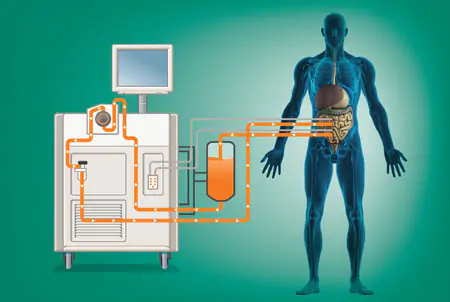Hipec And Peritonectomy
Hipec And Peritonectomy
 The biggest threat with cancers is their spread throughout the body and resulting damage which makes the treatment that much more difficult. One particularly tricky spot is cancer that is spread to the lining of the abdominal cavity (peritoneum and/or peritoneal cavity).
The biggest threat with cancers is their spread throughout the body and resulting damage which makes the treatment that much more difficult. One particularly tricky spot is cancer that is spread to the lining of the abdominal cavity (peritoneum and/or peritoneal cavity).
The peritoneum is the serous membrane that lines the abdominal cavity. The peritoneum serves to support the organs of the abdomen and acts as a conduit for the passage of nerves, blood vessels, and lymphatics. The peritoneal cavity is a potential space defined by the diaphragm, walls of the abdominal and pelvic cavities, and abdominal organs.
Despite numerous recent advances in chemotherapy, the overall chance of chemotherapy being curative is still low, and the side effects are difficult for the patient to endure. However, when these cancers are confined to the peritoneal cavity, Hyperthermic Intraperitoneal Chemotherapy (HIPEC) becomes an option for candidate patients.
Before HIPEC Is Administered
The surgeon will surgically remove all visible tumors that can be removed throughout the peritoneal cavity. This is known as Peritonectomy/cytoreductive surgery. Following cytoreductive surgery, in the operative setting the surgeon will administer HIPEC treatment.
What Is HIPEC?
HIPEC stands for hyperthermic intraperitoneal chemotherapy. HIPEC is a major surgery. The term “Intraperitoneal” means that the treatment is delivered to the abdominal cavity. It’s a cancer treatment that pumps warm chemotherapy drugs into your abdomen. One large dose of chemotherapy is administered, but it is not as toxic. That is because the drugs are not injected into your bloodstream, so they do not move around your body as much as chemotherapy given through an IV.
The chemotherapy drugs are heated to about 106-109 degrees F. Cancer cells cannot handle heat and the heat also helps the drugs enter the cells more easily and work better.
How Does HIPEC Work?
During the HIPEC procedure, the surgeon will continuously circulate a heated sterile solution containing a chemotherapeutic agent throughout the peritoneal cavity, for a maximum of two hours. The HIPEC procedure is designed to attempt to kill any remaining cancer cells.
The procedure also improves drug absorption and effect with minimal exposure to the rest of the body. In this way, the normal side effects of chemotherapy can be avoided.
What Cancers Does HIPEC Treat?
HIPEC is used for hard-to-treat abdominal cancers, such as appendix and colorectal cancer, as well as peritoneal mesothelioma (a cancer of the lining of the abdomen, often caused by breathing in asbestos). It has also shown promise against ovarian and gastric cancer.
Advantages Of Using HIPEC With Peritonectomy
When the cancer is found only on the surface of organs and has not spread into the blood stream, cytoreductive surgery with HIPEC is a good option for some patients.
Cytoreduction ensures drastic reduction in tumor volume, induces the remaining cells to enter the fast proliferating (multiplying) phase of the cell cycle becoming more responsive to chemotherapy drugs.
